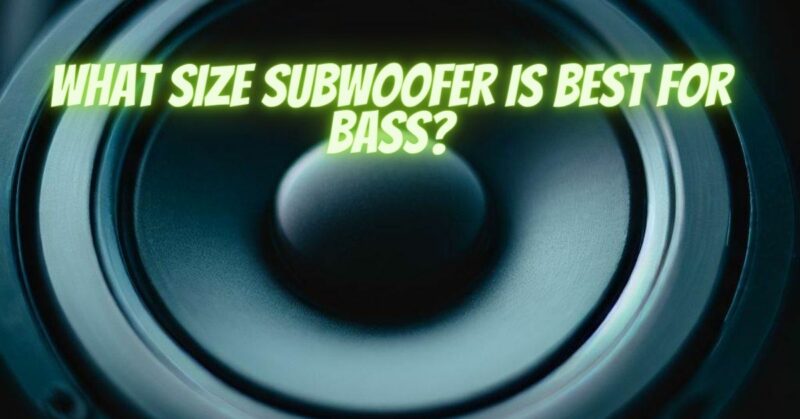The optimal woofer size for bass depends on a number of factors, including the type of music you listen to, the size of your room, your budget, and your desired sound quality.
Type of music
If you listen to a lot of music with deep bass, such as hip hop, electronic music, or rock, then you will want a woofer that is large enough to produce those low frequencies. A larger woofer will have more surface area, which will allow it to move more air and produce more bass.
If you listen to a lot of music with less bass, such as classical music or jazz, then you may be able to get away with a smaller woofer. However, it is important to note that even if you don’t listen to a lot of bass-heavy music, a larger woofer can still improve the overall sound quality of your system.
Size of your room
The size of your room will also affect the optimal woofer size. If you have a small room, then you may not need a very large woofer. In fact, a large woofer in a small room can be overwhelming.
If you have a large room, then you will need a larger woofer to produce enough bass to fill the room. A larger woofer will also be able to play at higher volumes without distorting.
Budget
Woofers can range in price from a few dollars to several hundred dollars. The price of a woofer will generally increase with size.
If you are on a tight budget, then you may want to consider a smaller woofer. However, if you can afford it, a larger woofer will provide better sound quality and bass performance.
Frequency response
The frequency response of a woofer refers to the range of frequencies that it can reproduce. A woofer with a wider frequency response will be able to produce a wider range of bass frequencies.
If you want to produce deep bass, then you will need a woofer with a wide frequency response. However, it is important to note that not all woofers with a wide frequency response will produce good bass.
Sensitivity
The sensitivity of a woofer refers to how efficiently it converts electrical power into sound. A more sensitive woofer will produce more bass with less power.
If you are using a low-powered amplifier, then you will want to choose a woofer with high sensitivity. This will allow you to produce more bass without having to buy a more powerful amplifier.
Power handling
The power handling of a woofer refers to the amount of power that it can handle before it distorts. A woofer with a higher power handling will be able to play at higher volumes without distorting.
If you want to play your subwoofer at high volumes, then you will need to choose a woofer with high power handling.
Other factors to consider
In addition to the factors listed above, there are a few other things to consider when choosing the optimal woofer size for bass:
- Enclosure type: The type of enclosure that you use will also affect the bass performance of your woofer. For example, a ported enclosure will generally produce more bass than a sealed enclosure.
- Placement: The placement of your subwoofer can also have a big impact on its bass performance. Try placing the subwoofer in different locations in the room to see what sounds best.
- Room acoustics: The acoustics of your room can also affect the bass performance of your subwoofer. If you have a room with poor acoustics, then you may not be able to get the most out of your subwoofer.
Choosing the optimal woofer size for bass can be a complex process. There are a number of factors to consider, such as the type of music you listen to, the size of your room, your budget, and your desired sound quality.
If you are not sure what size woofer to choose, it is a good idea to consult with a professional audio installer. They can help you to choose the right woofer for your needs and budget.


